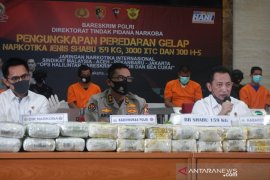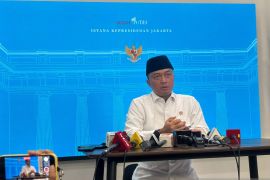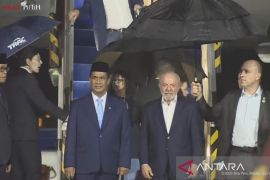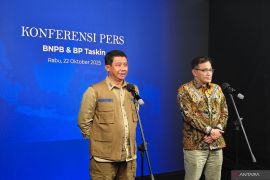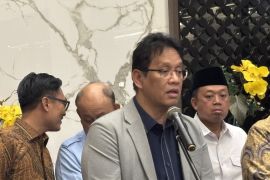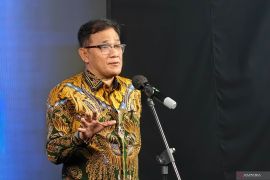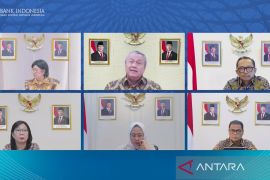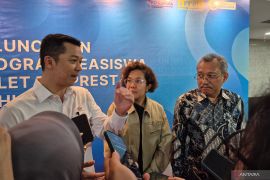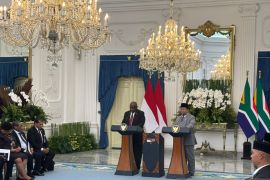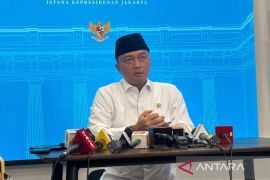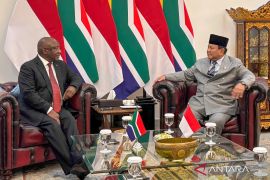"Last week, the customs officers at the Tanjung Balai Karimun seaport had arrested a Malaysian passenger for possessing 2,929 ecstasy pills. Imagine, how many Indonesian youths would have become victims if those ecstasy pills had passed through the eJakarta (Antara News) - The Indonesian government has declared a war against drugs and the authorities have intensified security measures to thwart illicit drug smuggling into the country.
In the latest success, the Indonesian army personnel safeguarding the countrys border with Malaysia managed to foil an attempt to smuggle two kilograms of crystal methamphetamine into the Panga Bintawa of Entikong check-point area, West Kalimantan Province, on April 13, 2016.
"The Indonesian border security task force personnel have captured two suspects," the Chief of Rem 121/ABW military command Brig. Gen. Widodo Iryansyah said on April 14.
The suspects, identified as Ewd, 26, and Fb, 41, were questioned and confessed that the two kilograms of the crystal meth caught from them was smuggled from Tebedu, Malaysia, into Entikong.
Furthermore, the Indonesian police disclosed that some 800 kilograms (kg) of crystal methamphetamine had been smuggled from Malaysia into Indonesia since 2012 by an international drug syndicate involving two Indonesian prisoners.
Prisoner Ricky Gunawan alias Ricky Bom-bom is lodged in the Cipinang Penitentiary in East Jakarta, while Anciong alias Karun is lodged in the Tanjung Gusta Penitentiary in Medan, North Sumatra.
"The network smuggled methamphetamine and ecstasy from Malaysia into Indonesia from 2012 to 2016 through the Malaysia-Panjang Straits-Cirebon maritime route," Adjunct Senior Commissioner Dony Setiawan, chairman of the Narcotics Investigation Center team of the Crime Investigation Directorate of the Indonesian Police, said in Cirebon, West Java, on April 6.
In fact, some 75 percent of drug distribution in the country was being run by several inmates from inside their prison cells, Indonesias National Narcotic Agency (BNN) has revealed.
The most notorious inmate running his business from inside the countrys jail cell is death row convict Freddy Budiman, known as the drug kingpin.
Freddy was sentenced to death in 2013 for importing ecstasy from Shenzhen, China, after police officers raided a truck containing 1.4 million such pills in Jakarta.
In the meantime, the Indonesian police recently destroyed 144 kg of crystal methamphetamine, 44 kg of liquid methamphetamine, 197,874 ecstasy pills, and 579 tons of dried hashish seized during raids carried out by the police, the BNN, and the Customs Excise office.
The drugs had been smuggled into Indonesia from Malaysia, China, Singapore, the Netherlands, Iran, Taiwan and Cambodia, by international drug syndicates, National Police Chief General Badrodin Haiti said in Cirebon on April 6.
Thanks to the success of the anti-drug operation, lives of some 1.9 million people were saved, Haiti said.
Soekarno Hatta Airport in Banten province is the main gateway to smuggle drugs to Indonesia, according to Finance Minister Bambang Brodjonegoro.
Since early this year, six attempts to smuggle drugs through the airport have been foiled, he said.
Other areas prone to drug smuggling are Batam, Tanjung Balai Karimun, Tanjung Pinang (Riau Islands) and Bandung (West Java).
The drugs had been smuggled into Indonesia mostly from Malaysia, the minister said, adding that "the rest came from Taiwan, Singapore, Iran and Nigeria."
Last March, West Jakartas police arrested a 37-year-old Chinese national for allegedly possessing 16 kg of crystal methamphetamine.
The anti-narcotic agency has revealed that some crystal methamphetamine smuggled into and distributed in Indonesia was produced in Malaysia, while the raw materials came from China.
"Based on investigations, the raw materials used in methamphetamine were found to be from China, while it was produced in Malaysia and marketed in Indonesia," Deputy BNN in charge of the Public Empowerment, Ins. Gen. Bahtiar Tambunan, said in Kendari, Southeast Sulawesi, on April 16.
The smugglers have targeted Indonesia as their market because the country has a large population and a vast territory, he said.
"Drugs produced in Malaysia have entered the Indonesian territory through land and sea routes, and some via airports," he said.
Indonesia has established cooperation with some neighboring countries to eradicate drugs, he said.
Chairman of the United Malay Organization (LMB) Datuk Panglima Azman Zainal in Karimun, Riau Islands Province, recently urged the Indonesian government to hold talks with Malaysia regarding efforts to curb drug smuggling attempts in the border area between Riau Islands in Indonesia and Malaysia.
"The government needs to hold bilateral talks with neighboring Malaysia as there is an impression that drugs could be easily smuggled from the neighboring country into Indonesia through the Riau Islands Province," he said.
Holding bilateral talks on the issue was important since attempts to smuggle narcotics from Malaysia had increased significantly, particularly through the seaports of Batam, Tanjung Balai Karimun and Tanjungpinang, he pointed out.
He lauded the Indonesian authorities, particularly the customs and excise officers, for having foiled several attempts to smuggle methamphetamine and ecstasy from Malaysia.
"Last week, the customs officers at the Tanjung Balai Karimun seaport had arrested a Malaysian passenger for possessing 2,929 ecstasy pills. Imagine, how many Indonesian youths would have become victims if those ecstasy pills had passed through the entry checkpoint," he stated.
He called on the Indonesian foreign ministry and other related institutions to approach Malaysia via diplomatic channels to address the lack of stringent checks on outgoing passengers at Malaysias seaports.
Zainal suspected that Malaysian citizens carrying drugs could freely move out of their country and enter Indonesia.
Indonesian diplomats should lobby with Malaysia to put outgoing and incoming passengers through strict checks, he emphasized.
Drug smugglers from Malaysia also included Indonesian nationals who were paid to work as couriers, he stated.
"I truly hope that Malaysia, as a nation of the same race, will not allow drugs to pass through its checkpoints as this could harm Indonesians. As a fellow Muslim-majority country, we follow a teaching that one must not harm another," Zainal added. ***2***
(f001/INE)
EDITED BY INE/H-YH
16-04-2016 23:56:08
Reporter: Fardah
Editor: Fardah Assegaf
Copyright © ANTARA 2016
